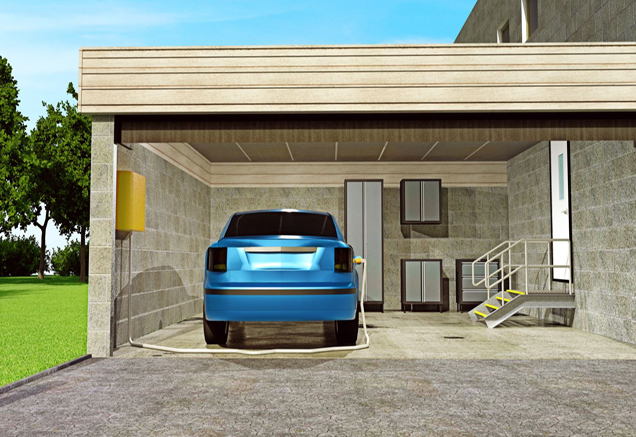Residential EV Charging Station Permit & Inspection Process

An electric vehicle (EV) charging station supplies electric energy for the recharging of electric vehicles or plug-in hybrids. Usually, an EV owner plugs in when returning home, and the car battery recharges overnight. For details about residential charging stations, including charging in the right-of-way, review the Residential Electric Vehicle Charging Permitting Guide.
For info about the permitting process,
email [email protected].
Electric Vehicle Charging Requirements
A State law that went into effect on Oct. 1, 2023, requires the construction of new housing units (single-family detached houses, duplexes, and townhouses subject to the International Residential Code) that include a separate garage, carport, or driveway, to include either an electrical vehicle supply equipment (EVSE) parking space installed from the electrical panel to the parking space capable of providing at least Level 2 charging (minimum of 208 Volts), or an electrical vehicle (EV) ready parking space that has electrical panel capacity and full circuit installation of a minimum 40-ampere, 208/240-volt circuit, raceway wiring, a NEMA 14-50R receptacle, and circuit overcurrent protection devices. Construction documentation must include the location of the parking space when applying for the building permit. The associated electrical permit must include details of the electrical vehicle charging. If you have questions about this requirement, contact DPS at 240-777-0311 or MC 311.
An electrical permit is required prior to the installation of a residential EV charging station if you are not using an existing outlet. A home charging station may require wiring to a dedicated circuit; an electrical permit is required for this installation.
An electrical permit must be applied for online using DPS ePermits. The applicant must have a valid Maryland Master Electrician’s license and have set up an Apply Online account. To begin using ePermits and ePlans, send a brief email request for a user account to [email protected] (if you are properly licensed and have not already done so) or you can visit the DPS eServices web page for additional information.
Covenants and Deed Restrictions - Many of the subdivisions and developments in Montgomery County have private deed restrictions and covenants regulating construction beyond the limitations contained in County ordinances. These amount to contractual agreements and thus the County does not enforce covenants and deed restrictions. Should you have questions about your development's restrictions, you may obtain information from your homeowner’s association or civic association.
Once the applicant completes the online electrical permit application and pays the fee, the permit will be automatically issued. Please note that no violations may be present on property to complete the application.
Please refer to our fee schedule for information regarding fees associated with this permit application type.
This permit requires one or more inspections as described in the Residential Electric Vehicle Charging Station Inspections document.
